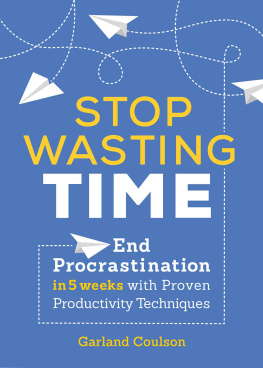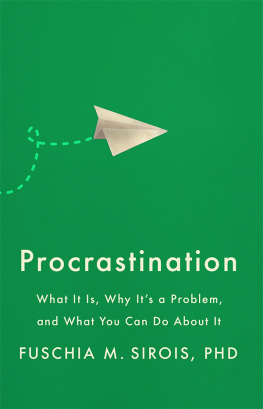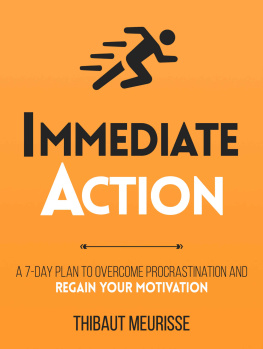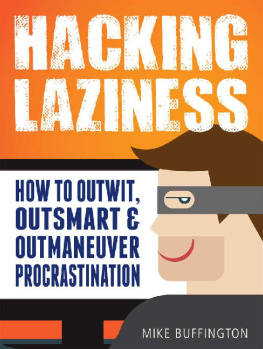Procrastination
Triple Your Productivity and Accomplish Your Goals
Warren R. Sullivan
Gamma Mouse
www.gammamouse.com
PROCRASTINATION
Copyright 2014 by Warren R. Sullivan.
All rights reserved.
First Edition: April 2014
1234567890
A Gamma Mouse eBook
Published by Gamma Mouse, a dba of Xilytics, LLC.
www.gammamouse.com
This document is geared towards providing exact and reliable information in regards to the topic and issue covered. The publication is sold with the idea that the publisher is not required to render accounting, officially permitted, or otherwise, qualified services. If advice is necessary, legal or professional, a practiced individual in the profession should be ordered.
From a Declaration of Principles which was accepted and approved equally by a Committee of the American Bar Association and a Committee of Publishers and Associations.
In no way is it legal to reproduce, duplicate, or transmit any part of this document in either electronic means or in printed format. Recording of this publication is strictly prohibited and any storage of this document is not allowed unless with written permission from the publisher. All rights reserved.
The information provided herein is stated to be truthful and consistent, in that any liability, in terms of inattention or otherwise, by any usage or abuse of any policies, processes, or directions contained within is the solitary and utter responsibility of the recipient reader. Under no circumstances will any legal responsibility or blame be held against the publisher for any reparation, damages, or monetary loss due to the information herein, either directly or indirectly.
Respective authors own all copyrights not held by the publisher.
The information herein is offered for informational purposes solely, and is universal as so. The presentation of the information is without contract or any type of guarantee assurance.
The trademarks that are used are without any consent, and the publication of the trademark is without permission or backing by the trademark owner. All trademarks and brands within this book are for clarifying purposes only and are the owned by the owners themselves, not affiliated with this document.
Introduction
Procrastination. It has a drastic effect on productivity, on our ability to accomplish our goals in life. It can greatly impact our happiness, as we avoid doing something that we are dreading. Yet having to do it still hangs over our head.
Delaying something in order to often do something easier is an easy trap to fall into. Do it enough, and it suddenly becomes a habit. The problem with procrastination is we usually put off more importantbut also more difficultobjectives for doing actions that are more trivial. For example, a college student might watch television rather than write a report.
Our time is valuable. It is the one thing that cannot be replaced, unlike money or objects. Yet it is wasted when we procrastinate. Saving this time should be our goal. We need to realize that our time would be better spend on accomplishing our most important objectives. When you have finished those, then reward yourself.
Stopping our procrastination is as easy as changing our attitude and stopping the habit that we have fallen into. In reading this guide, you will learn the tips and tricks necessary to stop procrastinating and start living. You dont have to suffer any longer, you can be happy and more productive, accomplishing all the important goals in your life quickly and easily. But you must take the first step and make a commitment to change yourself. Reading this book is a start, but if you dont act on what you learn change will not come. So consider this a call to action, a chance to truly change your life.
Limited Time Free Offer
Download the #1 Bestseller from Gamma Mouse Media for FREE! Hurry this offer wont last as it is for a limited time only. Reserve your free copy today at http://gammamouse.com.
Getting to the root of the problem
Everyone procrastinates. It is part of being human. Whether because of laziness or not having the energy to tackle a difficult task, we choose to relax, to take the easy way out. Understand that not all procrastination should be viewed as bad. Often we need a break from the rigors of our day, a chance to get away from the stress of life. Some goals require great effort and energy to complete, so tackling them when you dont have much energy is realistic.
The line we dont want to cross is when we fool ourselves into believing that laziness is not having the energy to complete our task. Our first step is to recognize when we are being lazy. Clearly, we need to be honest with ourselves, we need to hold ourselves accountable. Secondly, we need to realize that time is our most valuable resource, and that it is finite. No one knows how much time they have, so it is essential to understand how important time is. When you sit down to watch television, recognize that this is time you will never get back.
To borrow a phrase from economics, understand that there is an opportunity cost to ever action you take. When you choose to do something, you lose the opportunity to use that time differently. When you make a choice, there is always a cost, remind yourself of this when you find yourself procrastinating. One of my methods for reminding myself to utilize every minute of my time as effectively as I can is to write the number 1440 on the white board in my office. This is the number of minutes in one day. Whenever I find myself procrastinating, I look at my board, and it helps me refocus on my task at hand.
People procrastinate for different reasons. The first step is to understand the reasoning behind our procrastinating. There may be more than one, but understanding the psychology behind our choices will help us effectively combat them, allowing us to change our faulty reasoning when it arises.
Cognitive distortions are a form of irrational thinking that often lead to procrastination. It is a magically type of thinking. Often we believe that we will be better equipped at some point in the future to handle our task, rather than completely the task at that time.
An example is a person who believes that they need to be in a certain mood in order to complete a task successfully. Or a person may believe that their motivation will increase in the future, and thus will be in a better position to accomplish their goals. Another one that happens in business quite frequently is an employee overestimating the time they have left to complete a task while also underestimating how long it will take them to do it.
If you are putting off a task, because you believe that you will be better suited in the future, realize that you are committing a fallacy. There is no evidence suggesting that your belief is true.
When we are confused about how to complete a task, and the details involved, we may procrastinate giving the reason that we need further instructions before we can continue. This allows us to set the project aside, until we find that we are butting up against a deadline. This reasoning often comes up with perfectionists who do not want to start a task until they are confident in their ability to complete it perfectly. To combat this reasoning, understand that completely the task initially to the best of your abilities and understanding, and then waiting for feedback is much more productive. It is easy to make corrections to your mistakes once the task is completed, as opposed to trying to do the task perfectly the first time. And there is always the possibility that the goal will be accomplished on your first attempt, without the need for further clarification. Dont fool yourself into thinking that if you have additional information, you will be better suited to complete the task. This is a cognitive distortion.
Next page










